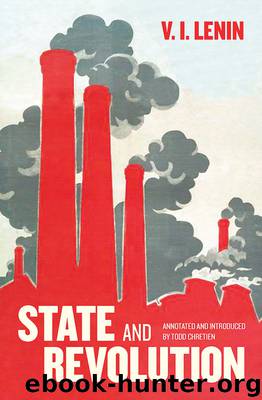State and Revolution by V. I. Lenin & Todd Chretien

Author:V. I. Lenin & Todd Chretien [Lenin, V. I. & Chretien, Todd]
Language: eng
Format: epub
Tags: Political Ideologies, Communism; Post-Communism & Socialism, ebook, History & Theory, Imperialism, Political Science
ISBN: 9781608465170
Google: rl29BwAAQBAJ
Publisher: Haymarket Books
Published: 2015-01-19T21:15:29+00:00
4. Criticism of the Draft of the Erfurt Program
In analyzing Marxist teachings on the state, the criticism of the draft of the Erfurt Program, sent by Engels to Kautsky on June 29, 1891, and published only ten years later in Neue Zeit, cannot be ignored, for it is with the opportunist views of the Social Democrats on questions of state organization that this criticism is mainly concerned.
We shall note in passing that Engels also makes an exceedingly valuable observation on economic questions that shows how attentively and thoughtfully he watched the various changes occurring in modern capitalism and how for this reason he was able to foresee to a certain extent the tasks of our present imperialist epoch. Here is that observation: referring to the word “planlessness” (Planlosigkeit), used in the draft program, as characteristic of capitalism, Engels wrote:
When we pass from joint-stock companies to trusts which assume control over, and monopolize, whole industries, it is not only private production that ceases, but also planlessness.17
Here we have what is most essential in the theoretical appraisal of the latest phase of capitalism, i.e., imperialism, namely that capitalism becomes monopoly capitalism. The latter must be emphasized because the erroneous bourgeois-reformist assertion that monopoly capitalism or state-monopoly capitalism is no longer capitalism, but can now be called “state socialism” and so on, is very common. The trusts, of course, never provided, do not now provide, and cannot provide complete planning. But however much they do plan, however much the capitalist magnates calculate in advance the volume of production on a national and even on an international scale, and however much they systematically regulate it, we still remain under capitalism—at its new stage, it is true, but still capitalism, without a doubt. The “proximity” of such capitalism to socialism should serve genuine representatives of the proletariat as an argument proving the proximity, facility, feasibility, and urgency of the socialist revolution and not at all as an argument for tolerating the repudiation of such a revolution and the efforts to make capitalism look more attractive, something all reformists are trying to do.
But to return to the question of the state. In his letter Engels makes three particularly valuable suggestions: first, in regard to the republic; second, in regard to the connection between the national question and state organization; and, third, in regard to local self-government.
In regard to the republic, Engels made this the focal point of this criticism of the draft of the Erfurt Program. And when we recall the importance the Erfurt Program acquired for all the Social Democrats of the world and that it became the model for the whole Second International, we may say without exaggeration that Engels thereby criticizes the opportunism of the whole Second International. Engels wrote, “The political demands of the draft have one great fault. It lacks precisely what should have been said.”18
Later on, he makes it clear that the German Constitution is, strictly speaking, a copy of the extremely reactionary Constitution of 1850; that the Reichstag is
Download
This site does not store any files on its server. We only index and link to content provided by other sites. Please contact the content providers to delete copyright contents if any and email us, we'll remove relevant links or contents immediately.
| Anthropology | Archaeology |
| Philosophy | Politics & Government |
| Social Sciences | Sociology |
| Women's Studies |
The Secret History by Donna Tartt(18190)
The Social Justice Warrior Handbook by Lisa De Pasquale(11957)
Thirteen Reasons Why by Jay Asher(8461)
This Is How You Lose Her by Junot Diaz(6452)
Weapons of Math Destruction by Cathy O'Neil(5842)
Zero to One by Peter Thiel(5498)
Beartown by Fredrik Backman(5369)
The Myth of the Strong Leader by Archie Brown(5243)
The Fire Next Time by James Baldwin(5024)
How Democracies Die by Steven Levitsky & Daniel Ziblatt(4966)
Promise Me, Dad by Joe Biden(4912)
Stone's Rules by Roger Stone(4867)
100 Deadly Skills by Clint Emerson(4695)
A Higher Loyalty: Truth, Lies, and Leadership by James Comey(4558)
Rise and Kill First by Ronen Bergman(4549)
Secrecy World by Jake Bernstein(4395)
The David Icke Guide to the Global Conspiracy (and how to end it) by David Icke(4386)
The Farm by Tom Rob Smith(4329)
The Doomsday Machine by Daniel Ellsberg(4250)
